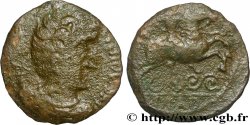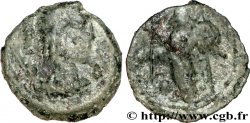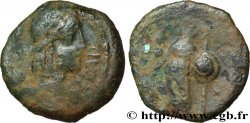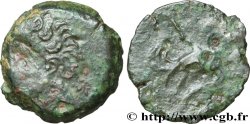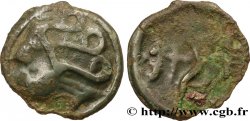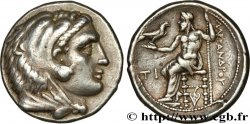Лицевая сторона
Аверс: легенда: ANÉPIGRAPHE.
Аверс: описание: Tête à gauche, les cheveux retenus en grosses mèches enroulées ; grènetis.
Обратная сторона
Реверс: легенда: ANÉPIGRAPHE.
Реверс: Описание: Cheval bondissant à gauche ; une esse au-dessus de la croupe et un anneau entre les jambes.
Комментарий
Историческая справка
GALLIA - ARVERNI (Area of Clermont-Ferrand)
(2nd - 1st century BC)
The Arvernes, who occupied the current territory of the former province of Auvergne, were the most powerful of the peoples of Gaul on the eve of the War. This name is also given to the different client peoples of the Arvernes: Gabales, Vellaves, or Helvii. Strabo evokes the supremacy that had prevailed in the 4th and 3rd centuries BC. -VS. when the Arvernes dominated Gaul: "their territory originally extended as far as Narbonne and the borders of Massaliotide and the peoples were subject to them as far as Mount Pyrene, to the Ocean and to the Rhine ", i.e. almost all of Gaul on the eve of the conquest. This power rested on the control of the tin trade and on mercenary. However, it is necessary to abandon the idea of an economic and monetary domination of the Arvernes over the other peoples of Gaul before the fall of the Arverne Empire.. Arverne society was clannish, due to their geographical arrangement, in valleys isolated by mountains. Each group was in the hands of a family and its customers. Their real capital was the oppidum of Gergovie, placed near Clermont-Ferrand. The Puy de Dôme was a kind of "Olympus" for the Arvernes where Mercury in his Gallic form of Lug was venerated. "Avernorix" (King of Arverni) was an epithet of the god. The Gauls already knew the thermal springs of Bourboule, Mont-d'Or, Royat, Volvic and Chaudes-Aigues which were sacred and used for their therapeutic virtues.. The forest of Pionsat which separated the Arvernes from the Bituriges Cubes was sacred. The reputation of the Arvernes went far beyond the territory of Gaul. The Arverni were considered "the most warlike among the Gallic peoples of the Celtic" according to Apollodorus in the 2nd century BC. -VS. Mercenaries and skilled warriors, it is possible that they participated in the sack of Delphi in 279 BC. -VS. and that they took part in the Battle of Telamon in 225 BC. -VS. which opposed them for the first time to the Romans. The first direct conflict broke out in the 2nd century, when Roman merchants settled in Transalpine in what was to become Provincia (the Province, which became Provence). The Arverni were very wealthy and their king Luern was known for his proverbial liberality. The Arverni, who did not have a developed agriculture, certainly controlled the gold panning and the gold mines of their countries and those of their neighbors. Luern's son, Bituit (Bituitos), opposed the Romans who had just subjugated the Salyens by seizing Entremont in 123 BC.. -VS. Bituit brings together a strong coalition of two hundred thousand men which was successively beaten by Domitius Ahenobarbus at the confluence of the Sorgue and the Rhône, then of the Isère and the Rhône, near Valence. The Arvernian Empire had lived. Abolished royalty was replaced by an oligarchic system. Celtille (Celtillos), the father of Vercingetorix was put to death around 80 BC. -VS. for trying to rebuild an Arverni Empire for his benefit. At the start of the Gallic Wars, Vercingetorix served in Caesar's reconnaissance troops. Gobannitio, uncle of Vercingetorix, was one of the leaders of the pro-Roman faction. It was only in 52 BC. -VS. that Vercingetorix became the leader of the coalition of Gallic peoples against the Roman occupier. Strong of nearly two hundred and fifty thousand men, the Arverne contingent did not succeed in imposing itself. Vercingetorix practiced the scorched earth policy after the fall of Genobum (Orléans), but could not obtain the destruction of Avaricum (Bourges) which was besieged and taken by Julius Caesar with all its food reserves. He nevertheless won a great victory near Gergovie. Having inadvertently pursued Caesar's army, he found himself besieged in Alesia. Resisting fiercely, he counted on the relief army to deliver him, but defeated, he had to surrender to Caesar who kept him alive to make him participate in his triumph in 46 BC.. -VS. Vercingetorix was then strangled in his prison. After the conquest, Augustonemetum (Clermont-Ferrand) is founded and becomes the capital of the civitas. Caesar (BG. I, 31, 45; VII, 3, 5, 7-9, 34, 37, 38, 64, 66, 75, 77, 89, 90; VIII 4, 46 76, 83, 88). Strabo (G. IV, 1-3). Livy (HR. , V, 34; XXVII, 39). Pliny (HN. , IV, 109; VII, 166, XXXIV, 45, 47) Kruta: 46, 71, 109, 111, 187, 308-310, 338-339, 349, 351.








 Cообщить об ошибке
Cообщить об ошибке Распечатать страницу
Распечатать страницу Отправить мой выбор
Отправить мой выбор Задать вопрос
Задать вопрос Consign / sell
Consign / sell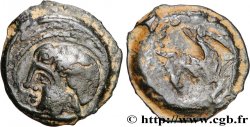
 Информация
Информация